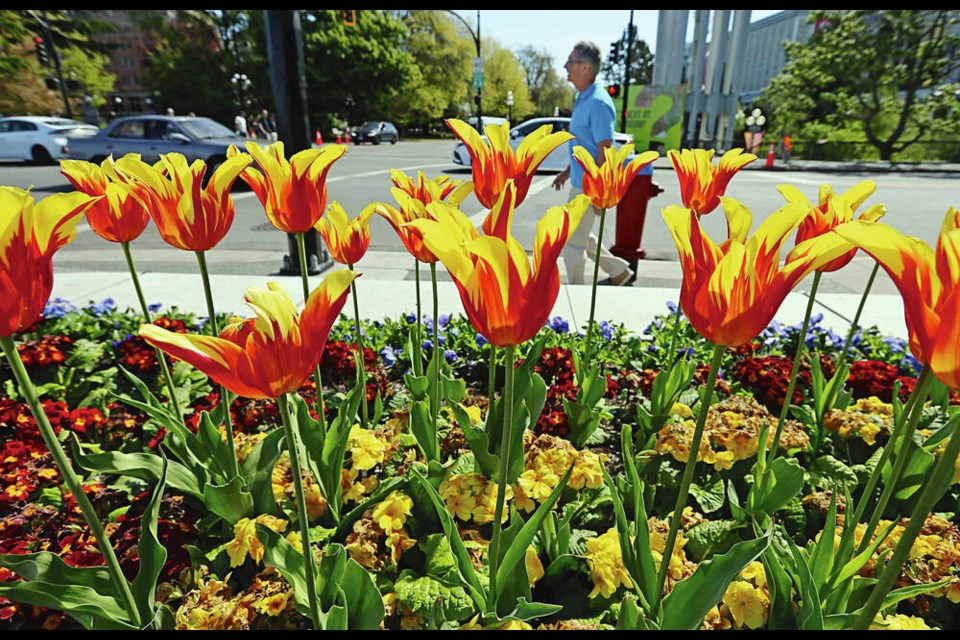Dear Helen: I would like to plant a large number of daffodil and tulip bulbs in our borders. My concern is our local water supply and how much water the bulbs might need if we have a repeat of last October’s warm, dry weather.
N.D.
It is a concern, though the weather so far is shaping up to be a little cooler, with a little more rain, than last autumn.
I presume that, in case of another warm, dry October, you will have to keep the borders with the newly planted bulbs watered anyway. The bulbs need only a modestly moist, well-drained soil that has cooled to below 15 C.
The simplest way to determine the best timing for planting bulbs in the fall is to track the weather and plant when there is a clear pattern of cooling, damper conditions.
Dear Helen: Last year I bought seeds of the Lunga di Napoli squash you wrote about. My plant grew well, but the fruits it formed either dropped away or appeared too late to mature. I’ll try again.
M.H.
I’m sorry to hear of this disappointment. The plant I gave my son did not set fruit either.
Old heritage varieties can be unpredictable. As with heirloom tomatoes, these squash varieties often take longer than others to set and ripen fruits.
The three Lunga fruits on my vines surprised me. As with the other heirloom squash I grew, Pennsylvania Dutch Crookneck, I just planted the seeds in a compost heap topped with good soil and hoped for the best. Both produced well, though the Lunga vines took what seemed ages to set fruit and the first one that formed rotted away.
I don’t usually bother with repeat plantings of “fussy-plants” but this squash is so easy to cut and use, and so wonderfully delicious, that I’ll be seeding it in my garden every spring.
I did incorporate a little bone meal for phosphorus and wood ashes (pottassium) into the partly decomposed compost mass and top layer of good soil before seeding, to balance out the preponderance of nitrogen usually to be found in compost as it nears full decomposition.
Dear Helen: The potted salvias on my balcony have attracted hummingbirds all summer. They are all described on the labels as perennials. I want to try wintering them and would appreciate any advice you can give me. Should I cut them back later in the fall?
H.S.
The salvias you describe (Skyscraper, Amethyst Lips) are close to borderline perennial, and in containers on a balcony they can most likely be considered tender perennials. Still, it’s worth trying to save them.
As temperatures begin dropping toward freezing, move the pots against the apartment wall and with freezing weather wrap the pots with old blankets, burlap. or whatever materials you have on hand. Or, set the pots inside a cardboard box and pack straw or some other insulating material around and over the pots.
During bouts of mild winter weather, uncover the pots to introduce fresh air and check that the soil is not drying out completely.
An alternative would be to find a friend with a greenhouse or other protective structure where you could store the plants for the winter.
Prune away dead foliage from the plants, and trim remaining foliage enough to make it easy to protect the pots and plant crowns.
Dear Helen: This is a somewhat crazy question, but I’m desperate. My neighbour’s tree is dropping acorns by the bucketful. The noise is like gunfire each time a group of them drop onto the tin roof of his carport. I can’t think of any way to stop the tree from shedding its acorns. Can you think of anything?
S.S.
All that comes to mind is to collaborate with your neighbour to find some material like an old, thick blanket or sheets of bubble wrap or cardboard to muffle the sharpness of the sounds the acorns make when striking the roof.
GARDEN EVENT
View Royal meeting. The View Royal Garden Club will meet this evening (Wednesday, Sept. 27) at 7:30 in Wheeley Hall, behind Esquimalt United Church, 500 Admirals Rd. Entrance is off Lyall St. Maria Hendrix, from West Bay Rock Gardens, will describe how to create successful, long-lived, drought tolerant and low maintenance rock gardens. A judged mini-show will feature exhibits from members’ gardens. Everyone is welcome. Non-member drop-in fee $5. .



